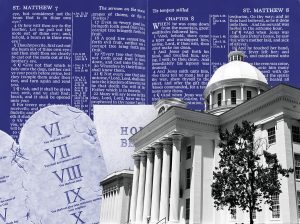
Some members of the Alabama Legislature and lawmakers in other states have proposed bills mandating religious indoctrination in public schools, believing that this will address society’s perceived “ills.” Supporters of these beliefs occasionally win minor victories but overall have suffered more defeats. Their arguments reflect an intentionally distorted understanding of history that clashes with the Founding Fathers’ intentions to keep church and state separate.
Acutely aware of the destructive outcomes in Europe of intertwining religion and politics, the nation’s Founders — many sometimes attending church services, though professing allegiance to none — determined to avoid this grievous misjudgment. Agreeing with Thomas Jefferson and James Madison that neither the states nor the federal government should favor any religion, their efforts led to the First Amendment’s wording that “Congress shall make no law respecting an establishment of religion.”
Modern courts, including the nation’s Supreme Court, have not always agreed with the Founders, nor held to a long lineage of court rulings upholding constitutional church-state separation. Instead, some courts have increasingly made rulings contradictory to the No Establishment Clause of the First Amendment. Those rulings favor Christian Nationalists’ denial that America was founded as a secular nation, and their demands for a return to theocracy.
State-level lawmakers’ favoritism of Christianity is often directed at public schools, taking the form of mandatory reading of biblical passages, the incorporation of a religious perspective in curricula, required daily prayer and/or the placing of the Decalogue in classrooms and other school locations.
Nonetheless, all such efforts remain unconstitutional — and reflect biblical ignorance.
For Christians, mandating Christianity in public schools poses significant issues. First and foremost, which version of the Bible should be used? All English Bible translations — some 80 in total, nonidentical, their selections of biblical books inconsistent — bear limited resemblance to the earliest known scriptural scrolls and fragments. Written in Hebrew, Greek or Aramaic, many early texts lack punctuation and spaces between words. Capitalization varies greatly, while many words of those ancient languages lack modern equivalents in the English language.
In addition, personal vanity and political agendas shaped the still-popular 1611 King James Version of the Bible. Determined to force conformity of the Christian faith within his kingdom — and sideline previous English versions critical of his majesty — King James I commissioned his “authorized” Bible as a method of control over his subjects. Many modern Bible versions have their own translation biases.
In short, any selected Bible will inevitably be inappropriate — possibly heretical — for non-Christian children, those of no faith at all and adherents of certain Christian denominations, which, according to the Center for the Study of Global Christianity, number nearly 50,000 in total.
Allowing some children to opt out or leave the room for either Bible reading or prayer — a practice long found to be discriminatory — creates tension with peers and adults. Yet, coercing all students to partake in approved prayers leads to conflicts with family members and faith leaders. Either option could impact children’s mental health. Even past efforts to create neutral, all-inclusive prayers have fallen short, leaving everyone, regardless of faith, dissatisfied.
There is more still: the presumption, on the part of elected officials and their supporters who desire religious mandates in schools, that such measures would alleviate perceived personal and cultural moral failings — many of which they themselves possess, thereby negating what they preach. “Christians are imperfect but forgiven” is an overused platitude, especially by those who egregiously and repeatedly offend.
Hypocrisy abounds even in the highest of places. The president’s religious advisor used her position recently to sell miracles. Many Christians in positions of political power fail to wash the feet of people experiencing poverty as did Jesus, instead fleecing them or reducing their benefits.
Do we want a government built on this type of corruption and callousness?
When therapists work with parents on discipline issues, a standard recommendation is that demonstrating proper behavior is the most effective means of influencing children’s actions. The same applies to adults. The adage “Don’t do as I do, do as I say” is counterproductive, as people place more value in actions than words — a truism Christian Nationalists have failed to learn.

In conclusion, rather than attempting to solve societal problems by imposing religious practices in schools, these individuals could more effectively produce change by modeling what they preach. Rather than trying to destroy the Constitution, which protects both church and state, they should accept its foundational philosophy, which allows for a pluralistic society that honors our nation’s rich tapestry of faiths and philosophies.
Dr. Broner was a psychologist. Presently, he studies and writes about healthcare, medical ethics, history, religion and politics. (This article represents the personal views of the author and does not necessarily represent the views of Americans United.)